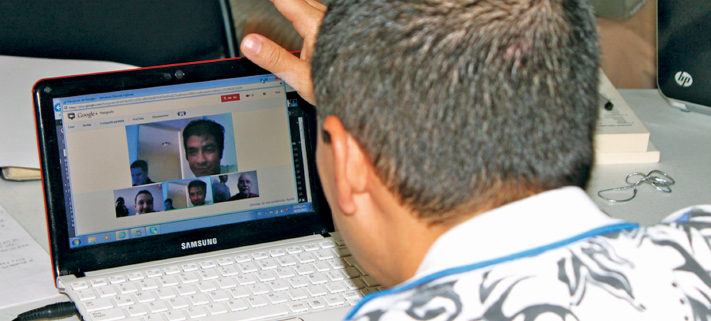One in Christ: One in service: Part 4
So many issues can divide us, but the Word of truth unites us as we arm ourselves with God’s armor.
James R. Huebner
The apostle Paul was unafraid to broach touchy subjects and to press the hot buttons of his day. Those buttons are still hot in our world, in our American culture, and in our synod. These subjects bring to light differences of opinions or differences in the way we approach issues, problems, and concerns. They can divide us. But they are also opportunities for us to demonstrate our common commitment to God’s truth. In other words, every generation needs to recapture the truths and principles of Holy Scripture for itself in order to be one in service to God and to each other.
THREATS TO UNITY
Paul addresses a very real threat to the spiritual unity in the Ephesian congregation, namely, Satan’s tool of sexual impurity. If you are unaware of the assault on biblical morals and values created by the efforts of the LBGT crowd to shift homosexuality from a moral issue to a political issue in the minds of Americans, you better pinch yourself to see if you’re still breathing. Has the availability of pornography through the Internet become a plague on our society and also affected our church members and called workers? Yes.
But people who fall prey to homosexual or heterosexual sin are not the enemy. They are victims of the enemy. They need to hear what God has to say about their sin and their Savior in an honest, compassionate, and winsome way. We help heal them and draw them to Christ and then their fellow believers as we speak the Word of truth in love. We do the same things in our discussions on the biblical principles of God-pleasing gender interaction and application of those principles.
When the apostle addressed the issue of parent-child relationships and as we observe the break-up of the family in our society, we value all the more the precious privilege of enhancing through Lutheran schools what children learn about Jesus in God-fearing homes. But how can we also make every effort to shift the purpose for a congregation’s early childhood center, preschool, and Lutheran elementary school from primarily “taking care of our own” to “reaching out to the lost”? How do we work together as one in Christ? We do that by speaking the truth in love.
How can we learn to care more about others than ourselves so that not only employers and employees interact in God-pleasing ways, but we also ask everyone we know, “How are you doing today” and mean it? We do that by speaking the truth in love.
In these areas, we may long for perfect unity and oneness, but that will not happen on this side of heaven. Yet, we can demonstrate oneness in service to God and each other in our approach, in our attitude, and in the way we interact with each other, submitting “to one another out of reverence for Christ” (5:21). So we put ourselves in a position to catch the blessings God wants to pour out to us, and we are “completely humble and gentle . . . patient, bearing with one another in love” (4:2). We do that by speaking the truth in love and waiting for the Lord’s blessings on our efforts.
STAND FIRM. WEAR GOD’S ARMOR.
Can you see Paul, sitting at his writing desk, quill in hand, writing this letter? Out of the corner of his eye he sees the Roman soldier assigned to guard him that day, all fitted out and geared up for duty.
Ephesians, like all Christians, are locked in a battle with evil. Paul describes the armor God gives his warriors for the fight. “Put on the full armor of God, so that when the day of evil comes, you may be able to stand your ground, and after you have done everything, to stand” (6:13). There’s the enemy. Here’s the armory!
“Stand firm then, with the belt of truth buckled around your waist” (6:14). You can see that Roman soldier with his belt holding his tunic in place and housing his weapons. A faulty belt won’t hold in place what it’s supposed to hold. So it is with the belt of truth. Mix in some error, and you’ll be in danger of having God’s truth slip off your hips and roll away. Strap on the belt of God’s truth.
Stand firm “with the breastplate of righteousness” (6:14). The Roman soldier’s shining metal plate protected his chest and midsection. In a similar way, Jesus’ rightness protects our spiritual heart and lungs. We are declared right by God even though Satan loves to accuse us. Put on Jesus’ rightness as a breastplate.
Stand firm “with your feet fitted with the readiness that comes from the gospel of peace” (6:15). That Roman soldier is ready to move forward and carry out his duty. The good news of peace with God through Jesus keeps us balanced and able to dodge temptations but also keeps us light on our feet, ready to take the first step in kindness for the needy, in comfort for the hurting, in forgiveness for the guilty.
“Take up the shield of faith” (6:16). The Roman shield isn’t just to display the emblem of the soldier’s legion. He can maneuver it for protection. Your trust in Jesus does the same. Your faith shields you when the flaming arrows of temptation come sizzling in.
“Take the helmet of salvation” (6:17). Any head injury knocks you out of the fight. You must keep your wits about you. What better way to do that than to have the assurance of God’s promise of salvation! We wrap our thoughts in his love so that we can make wise decisions when challenged by a fork in the road or the enemy before us.
Take “the sword of the Spirit, which is the word of God” (6:17). Every Roman soldier needs an offensive weapon from the armory. It’s the sword. The Word of God is yours. And it works. Use it. You can slice and dice the devil and send him running. Wield the Word of God.
But God is not done. He has one more weapon in the armory for you to use so that we can be one in Christ. “Pray in the Spirit on all occasions with all kinds of prayers and requests. With this in mind, be alert and always keep on praying for all the Lord’s people. Pray also for me” (6:18,19). Pray for your family. Pray for your pastors, teachers, and staff members. Pray for your district and synodical leaders. Pray for your synod. Pray for the lost, which means praying that God will unite us as individuals, as congregations, and as a synod in this glorious task to save lost souls.
No matter how old or young you are, no matter how tall or short you are, no matter what the amounts and distribution of melanin pigment in your skin, no matter where you live, we are one in service to God and each other. That’s what it means to be one in Christ.
James Huebner, pastor at Grace, Milwaukee, Wisconsin, is the first vice president of WELS.
This is the final article in a four-part series based on the 2015 synod convention essay entitled “One in Christ.”
SUBMIT YOUR STORY
Do you have a manuscript, idea, or story from your own life you’d like to share for use in Forward in Christ or on wels.net? Use our online form to share it to our editorial office for consideration.
SUBSCRIBE TO FORWARD IN CHRIST
Get inspirational stories, spiritual help, and synod news from Forward in Christ every month. Print and digital subscriptions are available from Northwestern Publishing House.
Author: James R. Huebner
Volume 103, Number 5
Issue: May 2016
Copyrighted by WELS Forward in Christ © 2021
Forward in Christ grants permission for any original article (not a reprint) to be printed for use in a WELS church, school, or organization, provided that it is distributed free and indicate Forward in Christ as the source. Images may not be reproduced except in the context of its article. Contact us






